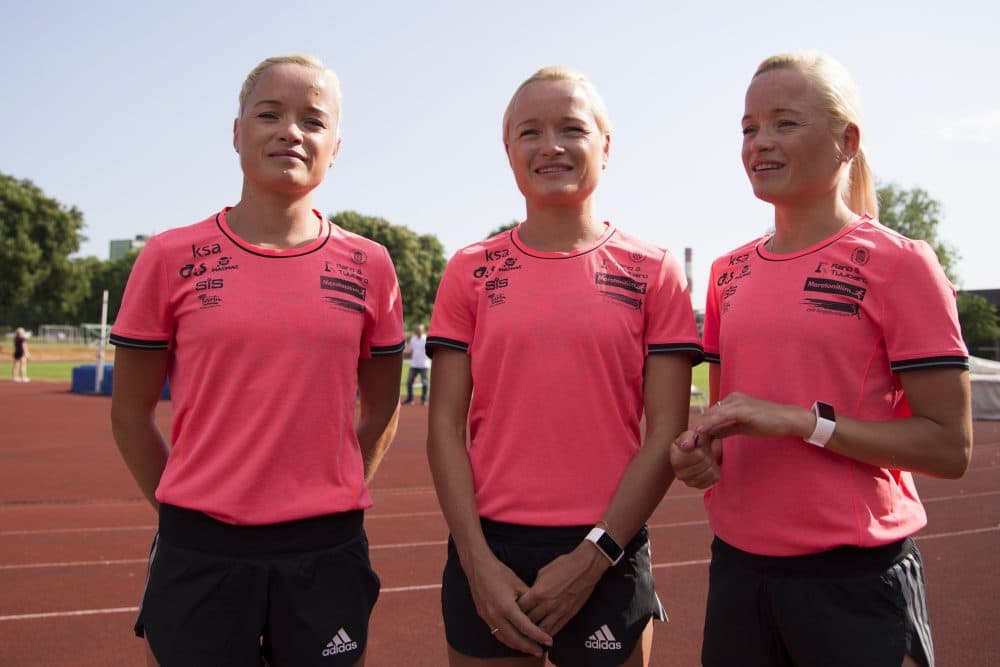Advertisement
Historian Tracks Twins And Triplets At the Olympics
Resume
Bill Mallon is an Olympic historian, but he's not just your average hum-drum sort of Olympic historian.
"There's a sub-group of people and we call ourselves the OlyMADmen," Mallon said. "We actually named ourselves before the TV show, but it relates to our sort of insane interest in this hobby."
Mallon is also a former pro-golfer, and he recently retired from a career as an elbow and shoulder surgeon.
But, since his days in medical school — when he says he found himself with a little spare time — Mallon's "hobby" has been collecting every stat, every bio, every story from every Olympian. And like other sports-related avocations, it's a pretty competitive field.
"Oh yeah, absolutely. We love it when we come up with something new," Mallon said. "I came up with something about a tennis player from 1924 that nobody knew anything about earlier this year. I loved it when I found it."
"Well, tell me what you found," I said.
"Well, it was a guy, a tennis player from Ireland, who was always listed as Edwin McCrea. And we couldn't find anything about him. We had no data about him at all. And then, for some reason I went to a tennis forum, and it listed him as Edwin Darcy McCrea. So then I just googled Darcy McCrea. It turns out he was a urologist in Ireland, then moved to England. Then tragically in 1944 he and his wife were hosting a dinner party and a bomb from the Battle of Britain hit their house, killing them and everyone at their dinner party. I mean, it was an unbelievable story."
Not all the stories Mallon collects end quite so dramatically.
Mallon and his fellow OlyMADmen are in the process of signing a contract to become the official stats provider for the International Olympic Committee. And they've created a database — an electronic, searchable record that holds every tidbit of information they've obsessively collected over the years.
"And in that database we have a list of Olympic family relations," Mallon said. "Whenever one Olympian is related to another we put it in the database and at current I think there's about 7,000 relations in the database."
"I guess that's not incredible because genetics has a lot to do with how successful you are as an athlete," I said.
"Exactly, there's about 127,000 Olympic athletes to date," Mallon said. "So, let's see, probably about six percent of them are related in some way. It turns out, there are 200 sets of twins, incredibly enough it's an even 200 right now. Something like 185 of them have always competed in the same sport. I bet it relates to soccer moms, this way they only have to take the kids to one practice instead of two different sports."
But this year, one family from Estonia has raised the stakes. Twins, you say? Bah! How about triplets?
"How was it that you found out about the Estonian triplets Leila, Liina, and Lily Luik?" I asked.
"That one was easy. That's been all over the news," Mallon said.
They call themselves "The Trio to Rio" and all three are marathoners. Mallon says none of the sisters has come close to world-class times, so we shouldn't expect them to be medal contenders.
But as soon as "The Trio to Rio" qualified for Rio, people like me have been calling up Bill Mallon and asking if the Luik sisters really are the first triplets to compete in the Olympics. The answer is yes — but how can we be sure?
"The OlyMADmen have connections to a lot of Olympic historians from a lot of countries, we'd have heard about it if there'd been triplets," Mallon said. "Plus, I ran a query on our database — I'm pretty good with computers — and I ran query for three people with the same last name and same date of birth. And I came up with a few people, but I could quickly prove they weren't triplets."
"Given the competitive nature of the Olympics, should we expect to see quadruplets from somewhere qualifying?" I asked.
"That would be hard," Mallon said. "First of all, in something like track and field or in swimming, there's a limit on how many people can compete from the same country. The limit is two per event in swimming and three per event for track and field, so you can't have quadruplets in either of those. You can have it in a team sport. Field hockey might be the best chance for this to happen because there are 11 players."
Are you listening, moms of quadruplets? Field hockey is the sport, and the race is on for Tokyo 2020.
This segment aired on July 2, 2016.
